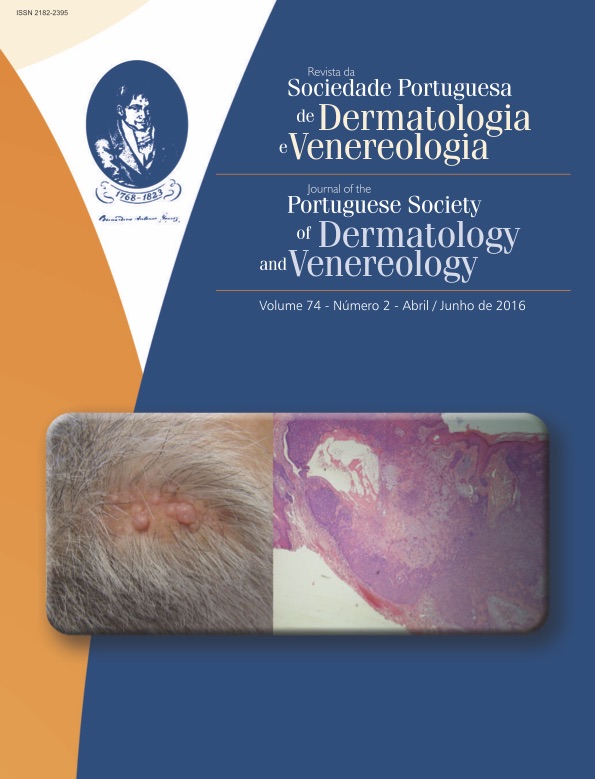The Development of an Inventory of Beliefs, Behaviors and Treatment of Acne - ICA
Abstract
Introduction: Acne is a disease with psychological consequences to patients based on personal and social factors and with a strong influence on the quality of life. The lack of information contributes to and nourishes beliefs and misunderstandings on acne that keep growing and find popular support in their mystification worldwide, although mostly without any scientific evidence.
Material and Methods: The present study is based on 75 interviews, 45 to Acne patients and 30 to Portuguese healthcare professionals and aims to contribute to a better understanding of acne in Portugal and to develop an instrument that is able to identify the main beliefs on Acne, comprising three dimensions: beliefs, behaviors and treatment.
Results: We have identified beliefs that are transversal to different countries in which concerns their influence on acne: diet, stress and lack of hygiene are considered to worsen Acne whereas sunlight and face washing favor its improvement.
Conclusions: It is important to know to what extent individuals with acne get information, seek for treatment and how that treatment evolves. A systematic, objective and universal process of data collection is useful to gather and treat pertinent information in order to improve the quality of information and education of Portuguese acne patients.
Downloads
References
Uslu G, Şendur N, Uslu M, Şavk E, Karaman G, Eskin M. Acne: prevalence, perceptions and effects of psychological
health among adolescents in Aydin, Turkey. J Eur Acad Dermatol Venereol. 2008; 22:462-9.
Poli F, Auffret N, Beylot C, Chivot M, Faure M, Moyse D, et al. Acne as Seen by Adolescents: Results of Questionnaire Study in 852 French Individuals. Acta Derm Venereol. 2011; 91:531-6.
Magin P, Adams J, Heading G, Pond D, Smith W. The causes of acne: a qualitative study of patient perceptions
of acne causation and their implications for acne care. Dermatol Nurs. 2006; 18:344-9.
Pearl A, Arroll B, Lello J, Birchall N. The impact of acne: a study of adolescents’ attitudes, perception and knowledge. N Z Med J. 1998; 111:269-71.
Pawin H, Chivot M, Beylot C, Faure M, Poli F, Revuz J, et al. Living with acne: A study of adolescents personal
experiences. Dermatology. 2007; 215:308-14.
Green J, Sinclair RD. Perceptions of acne vulgaris in final year medical student written examination answers. Australasia J Dermatol. 2001; 42:98-101.
Goodman G. Acne: Natural history, facts and myths. Aust Fam Physician. 2006; 35:613-6.
Ali G, Mehtab K, Sheikh ZA, Ali HG, Abdel Kader S, Mansoor H, et al. Beliefs and perceptions of acne among
a sample of students from Sindh Medical College, Karachi. J Pak Med Assoc. 2010; 60:51-4.
Yahya H. Acne vulgaris in Nigerian adolescents - prevalence, severity, beliefs, perceptions, and practices. Int J
Dermatol. 2009; 48:498-505.
Davidovici BB, Wolf R. The role of diet in acne: facts and controversies. Clin. Dermatol. 2010; 28:12-6.
Tahir M, Ansari R. Beliefs, perceptions and expectations among acne patients. J Pak Assoc Dermatol. 2012;
:98-104.
Talasiewicz K, Oldakowska A, Szczerkowska-Dobosz A. Evaluation of knowledge about acne vulgaris among a
selected population of adolescents of Tricity schools. Adv Dermatol Alergol. 2012; 29:417-20.
Magin P, Pond D, Smith W, Watson A. A systematic review of the evidence for ‘myths and misconceptions’ in acne
management: diet, face-washing and sunlight. Sam Pract. 2005; 22:62-70.
Rigopoulos D, Gregoriou S, Ifandi A, Efstathiou G, Georgala S, Chalkias J, et al. Coping with acne: beliefs and
perceptions in a sample of secondary school Greek pupils. J Eur Acad Dermatol Venereol. 2007; 21:806-10.
Hedden SL, Davidson S, Smith CB. Cause and Effect: The relationship between acne and self-esteem in the
adolescent years. J Nurse Pract. 2008; 4:595-600.
Brajac I, Bilić-Zulle L, Tkalčić M, Lončarek K, Gruber F. Acne vulgaris: myths and misconceptions among patients
and family physicians. Patient Educ Couns. 2004; 54:21-5.
Tan JK, Vasey K, Fung KY. Beliefs and perceptions of patients with acne. J Am Acad Dermatol. 2001; 44:439-
Mashat S, Sharif N, Zimmo S. Acne awareness and perception among population in Jeddah, Saudi Arabia. J
Saudi Soc Dermatol DermatolSurg. 2013; 17:47-9.
Corey KC, Cheng CE, Irwin B, Kimball AB. Self-reported help-seeking behaviors and treatment choices
of adolescents regarding acne. Pediatr Dermatol. 2013;30:36-41.
McEvoy B, Nydegger R, Williams G. Factors related to patient compliance in the treatment of acne vulgaris. Int
J Dermatol. 2003; 42:274-80.
Reich A, Jasiuk B, Samotij D, Tracinska A, Trybucka K, Szepietowski JC. Acne vulgaris: what teenagers think
about it. Dermatol Nurs. 2007; 19:49-64.
Cheng CE, Irwin B, Mauriello D, Liang L, Pappert A, Kimball AB. Self-reported acne severity, treatment, and belief
patterns across multiple racial and ethnic groups in adolescent students. Pedriatr Dermatol. 2010; 27:446-52.
Liu L. Sensitising concept, themata and shareness: A dialogical perspective of social representations. J Theo
Soc Behav. 2004; 34: 249-64.
Arendt F, Steindl N, Vitouch P. Effects of new stereotypes on the perception of facial threat. J Med Psychol. 2014.
-9.
All articles in this journal are Open Access under the Creative Commons Attribution-NonCommercial 4.0 International License (CC BY-NC 4.0).








